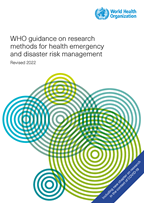- Home/
- Our Work/
- Health Emergencies/
- Research Methods/
- Sections and chapters/
- Section 7: How to become a researcher/
- Chapter 7.1 How to become a successful researcher
Section 7: How to become a researcher
Chapter 7.1 How to become a successful researcher

Research Methods for Health EDRM
Section navigation
- Section 7: How to become a researcher
- Chapter 7.1 How to become a successful researcher
- Chapter 7.2 How to identify and access reports of existing research
- Chapter 7.3 How to write a successful grant application for a research study
- Chapter 7.4 Getting ethical approval for your research
- Chapter 7.5 Doing Health EDRM research in the field
- Chapter 7.6 How to write up your research
- Chapter 7.7 Doing research in Health EDRM
Authors: Barach P, Van Zundert AAJ.
Chapter 7.1 describes the lifelong joys and challenges of becoming a successful researcher, by appreciating the importance and value of:
- Research helps to advance the level of treatment and care given to patients.
- Gaining a mastery of varied research methodologies to answer timely scientific questions.
- Field research conducted in real-world and natural environments, which give the researcher a deeper understanding and appreciation of care complexity topics and a respect for the research subjects.
- The ability to work autonomously, set clear goals, be organized, and have a good research plan while meeting deadlines and expectations.
- Mentorship and working collaboratively with other researchers, mentors, learning to lead with questions using mature listening and communication skills.
What is this chapter about?
The chapter is about the importance of research that helps the clinicians translate theory into practice. Understanding the process of generating, advocating for and learning how to use high quality research can drive better public awareness, discourse and health policy.
This chapter highlights the importance of understanding and learning about the variety of research methodologies that can be used to answer diverse research questions. It outlines the essential competencies required to become a successful researcher. The chapter also describes the importance of establishing research interests, conducting research in the field and emphasizes the importance of finding the right mentors and engaging in a culture of continuous education and improvement of health services.
What are the key messages of this chapter?
- Research is exciting, rewarding and innovative, improving the evidence of policies, reducing uncertainties and leads to improvements in patient care, practice and policy.
- Formal education is the foundation of a career as a researcher, and other key skills and practical training are vital too – such as refining your critical thinking and problem-solving abilities, a strong work ethic, good project management and communication skills, and being receptive to feedback. Nothing can replace the importance of immersion in the clinical challenges.
- It is important to establish your research interests. Why is this research needed now? Who cares about this phenomenon or research question? Will the research, if successful, make a difference to the people, patients, and systems affected by health emergencies and disasters? Why are you and your team well suited to study this problem?
- Research projects should be scientifically sound and guided by ethical principles in all their aspects and always be on guard for potential conflicts of interest that might confound findings.
- Doing research in the field can help to plug gaps in the data, improve data quality and rigor, and also give you and your research team a more nuanced understanding of the real-world context of a problem and potential suitability of proposed solutions.
- Finding the right mentor is essential and can be instrumental to a researcher’s career success.
- Research implementation is essential and while it may seem straightforward requires careful advanced planning, multiple stakeholder involvement, addressing other contextual constraints to increase chances for programme stickiness, scale up success and sustainability.
- The best research consists of an iterative process of learning and inquiry, is typically incremental, and is infused by everyday work and contextual experience and hard-earned lessons by researchers working closely with frontline clinicians and staff to provide exceptional, high quality and patient centered clinical care.
